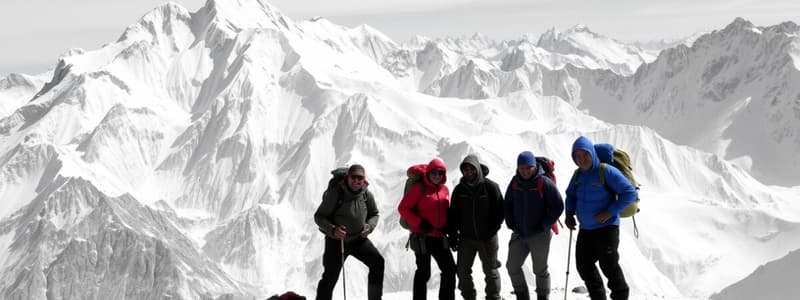Podcast
Questions and Answers
What is suggested as a common reason why people climb mountains?
What is suggested as a common reason why people climb mountains?
- To encounter and overcome physical challenges. (correct)
- To enjoy the company of others who also seek adventure.
- To seek scientific knowledge about mountainous terrains.
- To gain recognition for their climbing skills.
What aspect of mountain climbing does the author find most exhilarating?
What aspect of mountain climbing does the author find most exhilarating?
- The camaraderie shared with fellow climbers during the journey.
- The opportunity to encounter wild animals in their natural habitat.
- The demonstration of endurance, persistence, and will power. (correct)
- The ability to navigate through challenging terrains with ease.
Why does the author specifically mention Mount Everest?
Why does the author specifically mention Mount Everest?
- It has the most breathtaking views compared to other peaks.
- It is celebrated for its rich history and cultural significance.
- It is known for its numerous climbing routes.
- It is the highest mountain, presenting the ultimate challenge. (correct)
How does the author relate personal experiences to mountain climbing?
How does the author relate personal experiences to mountain climbing?
What emotional state does the author associate with reaching the summit of a mountain?
What emotional state does the author associate with reaching the summit of a mountain?
What emotion did Major H.P.S. Ahluwalia predominantly feel while standing on the summit of Everest?
What emotion did Major H.P.S. Ahluwalia predominantly feel while standing on the summit of Everest?
What did Major Ahluwalia express about the experience of climbing Everest?
What did Major Ahluwalia express about the experience of climbing Everest?
What contemplation did Major Ahluwalia have while getting down from the summit?
What contemplation did Major Ahluwalia have while getting down from the summit?
What does Major Ahluwalia suggest about climbing the 'summit of the mind'?
What does Major Ahluwalia suggest about climbing the 'summit of the mind'?
What mixed emotion did Major Ahluwalia feel upon achieving the summit?
What mixed emotion did Major Ahluwalia feel upon achieving the summit?
Flashcards are hidden until you start studying
Study Notes
Major H.P.S. Ahluwalia's Everest Journey
- Major H.P.S. Ahluwalia was part of the first successful Indian expedition to Mount Everest in 1965.
- Standing on the summit brought a mix of humility and sadness, rather than pure joy.
- Acknowledged the ultimate achievement in climbing but pondered the significance of reaching the highest point.
- Climbing Everest was described as a profound, lifelong transformative experience.
Reflections on Climbing
- The sense of accomplishment from reaching the summit elicited joy and thankfulness, leading to a deeper reflection on life's meaning.
- Personal motivations for climbing revolve around an innate attraction to mountains and their beauty, seen as a communion with God.
- The challenge of the ascent symbolizes the triumph over physical and mental obstacles.
Challenges of Everest
- Quesitoning the need to climb mountains, Ahluwalia asserts that the struggle itself offers exhilaration, representing endurance and persistence.
- The journey up and down Everest is grueling, with climbers facing life-threatening conditions.
The Nature of Mountains
- Mountains offer not just physical challenges but also a spiritual connection and transformation for those who scale them.
- Climbing the highest mountain provides a unique perspective on both nature and oneself, fostering a mystical change.
Themes and Concepts
- Enjoyment derived from overcoming significant obstacles reflects human resilience.
- The relationship between nature and spirituality is emphasized through the metaphor of mountains as bridges to divine communion.
The Importance of Experience
- Climbers often reflect back on their journeys, contemplating the fading memories versus the lasting impact of the ascent.
- The physical and emotional exhaustion climbers feel contrasts with the exhilaration of accomplishment and victory.
Exploration of The School Boy Poem
- The juxtaposition of Ahluwalia’s experiences to the 'School Boy' explores themes of joy versus obligation.
- The schoolboy's dissatisfaction with structured life reflects a yearning for the freedom contrasting with the climber's pursuit of challenge and self-discovery.
Poetic Reflections
- R.S. Thomas's poem "The One Furrow" contrasts the structured nature of education against the liberating simplicity of working with nature.
- Emphasizes the return to fundamental values and the search for peace outside the confines of formal learning.
Wordplay Concepts
- Highlighted (through directives) that everyday terms can often have misleading representations, exemplifying the whimsical nature of language.
Additional Reflection Components
- In discussing emotions associated with nature, consider how awe and humility can stem from climbing mountains, encouraging a sense of gratitude and peace.
- Suggestions for writing practices include creating compositions based on personal experiences in nature, paralleling feelings of reverence with physical exertion.
Studying That Suits You
Use AI to generate personalized quizzes and flashcards to suit your learning preferences.




